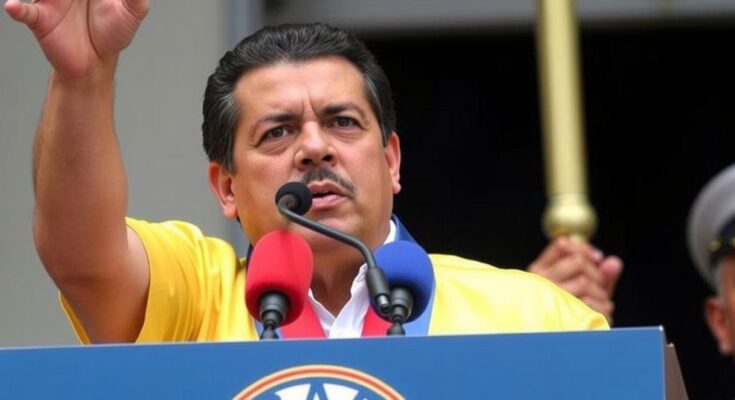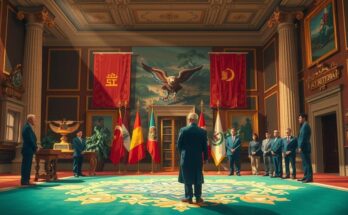Nicolás Maduro is set to be inaugurated for a contentious third term amidst accusations of electoral fraud and severe repression of dissent. Protests by opposition supporters have escalated, particularly against María Corina Machado’s temporary detention while advocating for Edmundo González as the rightful president. The international community has condemned the regime’s actions, underscoring the ongoing crisis in Venezuela’s political landscape.
On January 10, 2025, President Nicolás Maduro will be sworn in for a controversial third term, amidst widespread allegations of electoral fraud and civil unrest. Despite credible indications that opposition candidate Edmundo González secured a significant victory in the July 2024 elections, electoral authorities quickly declared Maduro the winner without transparency. This declaration has elicited protests across Venezuela, particularly from supporters of María Corina Machado, who were met with violent crackdowns by security forces. During a recent rally, Machado faced a brief detention as she advocated for González’s recognition as president. The international community has condemned Maduro’s regime for its suppression of dissent and its blatant disregard for democratic processes, with calls for Machado’s release resonating globally. As Maduro’s inauguration approaches, concerns about his repressive governance, further political violence, and the legitimacy of his election continue to dominate discussions.
The situation escalated following July’s elections, where the government failed to present detailed vote counts, leading the opposition to publicize their own data, asserting that González had received twice as many votes as Maduro. The ruling party has also faced backlash for arrests of demonstrators and reports of torture during detentions, contributing to the climate of fear and repression. Notably, international observers, including the U.S.-based Carter Center, deemed the opposition’s published vote tallies credible, contradicting the ruling party’s narrative and complicating Maduro’s claim to legitimacy.
As Nicolás Maduro prepares to solidify his control until 2031, the escalating tensions serve as a multi-layered crisis for Venezuela’s political landscape. There are still uncertainties regarding international attendance at the inauguration, particularly from allies like Colombia’s President Gustavo Petro, who has expressed concerns over the recent detentions of critics. Furthermore, González’s potential return from exile remains fraught with danger, as government threats loom over his safety.
Venezuela has faced a prolonged political crisis characterized by authoritarian governance under Nicolás Maduro, who has been in power since 2013. His recent re-election was marred by widespread allegations of electoral fraud and repression of opposition voices, particularly following the July 2024 elections, where many international observers raised concerns about the integrity of the electoral process. The opposition, fragmented yet vocal, continues to challenge Maduro’s legitimacy, leading to protests and violent crackdowns by security forces. Figures like María Corina Machado have emerged as key opponents, advocating for democratic restoration, while facing significant personal risk. This dynamic backdrop contributes to the ongoing tension as Maduro prepares for his inauguration.
In conclusion, Nicolás Maduro’s impending inauguration is emblematic of the deeper systemic failures within Venezuelan democracy, marked by significant allegations of electoral fraud and increasing governmental repression. Protest movements led by opposition figures such as María Corina Machado highlight the severe discontent among Venezuelans regarding Maduro’s rule. As international scrutiny mounts, the political future of Venezuela remains uncertain, with concerns about civil liberties and the safety of opposition leaders shaping the discourse surrounding the upcoming inauguration.
Original Source: apnews.com




